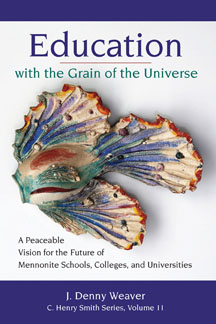| DFD |
||||||||
|
|
Summary: Is the grain of the universe really visible? Working from the statement that the nonviolent Jesus reflects the grain of the universe, this book demonstrates how the grain can be visible in any discipline of the academic curriculum or its application in the life of the church or wider society. Eighteen contributors shape philosophies of Mennonite higher educational institutions as they explore intersections of educational theories and practices with Anabaptism, Mennonite thought, and peacemaking. In order of appearance they are J. Denny Weaver, Justin Heinzekehr, Drew G. I. Hart, Felipe Hinojosa, Benjamin Bixler, Laura Brenneman, Jackie Wyse-Rhodes, Hannah E. Heinzekehr, Malinda Elizabeth Berry, Gerald J. Mast, Sarah Ann Bixler, Daniel Shank Cruz, Rebecca Janzen, Lowell Ewert, Rudi Kauffman, Lonna Stoltzfus, Zachary Walton, Angela Horn Montel. "This volume is an important resource for those who
value the place of
the academy alongside the church in advancing a justice-oriented world.
The diverse gathering of scholars skillfully speak to the challenges of
faithful ecclesiology in the twenty-first century, with a wide array
of clear-minded discussions that include spirituality, leadership,
gender, race, and sexuality." —Regina
Shands Stoltzfus, Assistant Professor of Peace, Justice, and Conflict
Studies, Goshen College "Like the crack of the whip when Jesus cleansed the temple, the writers share profound insights about nonviolent action that need to be heard both inside and outside of our religious institutions. The words in these pages will resound in readers as our faith comunity finds it way in an ever changing world." —Glen Guyton, Chief Operating Officer, Mennonite Church USA “I think readers will be most impressed by the tough questions, peculiar perspective, and aspirational sights that this volume of scholarship knits together. The collection is tailored to help lively interdisciplinary discussions in our Anabaptist educational institutions and our congregations. The take-aways are fulsome (encourage big gulps), imperative (demand attention), and challenging (are we ready for this?).” —Susan Schultz Huxman, President, Eastern Mennonite University, in the Foreword "If interested in Anabaptist-Mennonite education and how peace theology can serve as framework and context for our pedagogy, read this book. Writing from multiple perspectives, the authors inspire conversation and present a road map for how peacemaking and Anabaptist theology jointly provide a lens for everything we do, both in academia and the church." —Carlos Romero, Executive Director, Mennonite Education Agency The Editor: J. Denny Weaver, Madison, Wisconsin, editor of the C. Henry Smith Series, has written, edited, or co-edited many other books and shorter contributions, including Becoming Anabaptist. He is a frequent speaker in a variety of academic and church settings. His foreign experience includes service with Mennonite Central Committee, Christian Peacemaker Teams, and short-term teaching in Kenya and Congo. Weaver has lectured on atonement theology in the United Kingdom, the Congo, and Germany. Market: Educators, scholars, professors, and graduate students; anyone interested in intersections of educational theories and practices with Anabaptism, Mennonites, peacemaking, and more. Shelving: Education-Anabaptist-Mennonite; Peacemaking in the university curriculum; BISAC: Education, Religion, Social Sciences. RTM: 340 Education, 690 Religion/Ethics, 750 Sociology Publisher: Cascadia
Publishing House LLC |
|||||||





